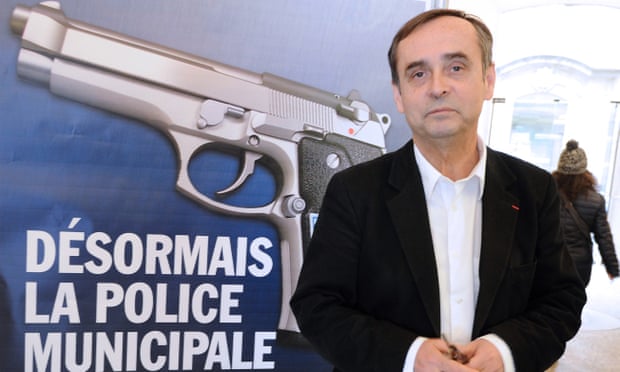Robert Ménard is outraging the left in France, who view his policies in Béziers as ‘pure provocation’ against secularism and immigration
Robert Ménard poses in front of a municipality campaign poster showing an 7.65-calibre handgun, with a campaign slogan reading: ‘From now on, the municipal police has a new friend.’
In the bullring of Béziers, with 8,000 people crammed into the stands and fanning themselves in the heat, an extraordinary spectacle began. France’s most controversial mayor, glancing up at the adoring crowds, solemnly paraded around the ring in an elaborate holy procession following an effigy of the Virgin Mary and a dozen horse riders in flamenco dresses watched over by priests. It was, he said, about reaffirming France’s Christian roots.
The vast, town hall-sponsored, public Catholic mass is unheard of in fiercely secular modern France, which has strict laws on the separation of church and state. It caused outrage on the left, which has accused the mayor of turning this picturesque but poverty-stricken Mediterranean town into an increasingly polarised “laboratory of the far right”.
When Ménard armed the local police with 7.65-calibre handguns and put posters of giant handguns across the town reading ‘Police officers have a new friend’, the Socialist government was outraged. Then police swooped on Ménard this spring when he claimed on live TV that he had counted the first names of nursery and primary school children in the town and determined that 64.6% were Muslim.
Ménard’s view is that immigration is France’s real problem. “Our immigration has to stop,” he said.
Although elected with the official support of Marine Le Pen and the far-right Front National, he has deliberately stayed outside the party. This leaves him free “to say what I want when I want”. But he is an important figure to the Front National. Last year Le Pen’s party gained a record 11 mayors across France, but Béziers, with a population of more than 71,000, is by far the biggest town run by a Front National-aligned mayor.
Le Pen, her eyes on a presidential bid in 2017, has insisted the Front National mayors keep their heads down and avoid the controversies that plagued the party when the party ran towns in the 1990s. Ménard, outside the party, is not bound by this and has dominated French headlines and transformed his town hall newsletter into a slick, polemical magazine. He is seen by many as further right than Le Pen and more socially conservative. He says they have a good relationship and she takes inspiration from some of his policies.
He doesn’t like the term “extreme right” preferring to talk of a rise in nationalist and patriotic feeling in a French electorate disgusted with traditional parties.
“I think he’s wonderful,” said one 92-year-old woman, a retired cleaner. “He’s really cleaning up the town. The police are a lot more visible. I’ve got nothing against Arabs; I’ve got lots of Arab friends, but there used to be too many Maghrebins [north Africans] just hanging around the square.”
“His media strategy as mayor of Béziers relies on polemics aimed at shattering the politically correct consensus on secularism, immigration, and even the poor.”
Ménard said: “The media can say whatever they want. My only concern is doing what I think has to be done for the people of Béziers and for my own convictions.”


